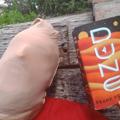Hopeful blending of science and spirituality
5 stars
I found Robin's mixing of science, indigenous wisdom and spirituality extremely compelling. Each is given respect within the pages of this book, as are the plants, animals and other parts of the earth alongside the humans who share them. This book gives me hope for a future where we can live harmoniously with the world around use - people, plants, animals and lands.
I found Robin's mixing of science, indigenous wisdom and spirituality extremely compelling. Each is given respect within the pages of this book, as are the plants, animals and other parts of the earth alongside the humans who share them. This book gives me hope for a future where we can live harmoniously with the world around use - people, plants, animals and lands.















